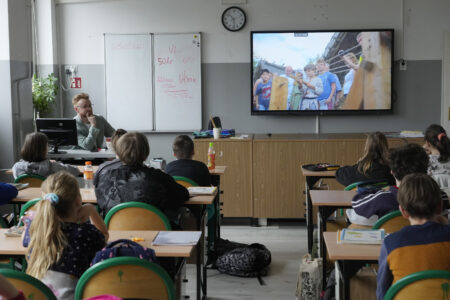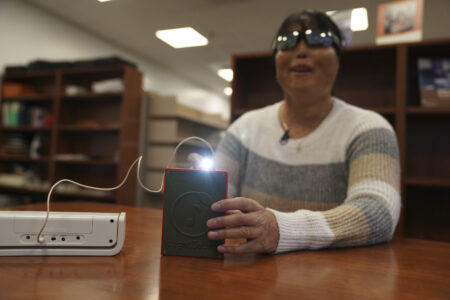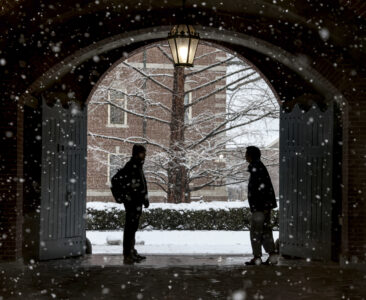‘Learn by doing’: Technical courses adapt during pandemic

Chris Wilkerson changes the oil in a vehicle during the automotive technology course at Appomattox County High School in Appomattox, Va., on Wednesday, July 8, 2020. (Kendall Warner/The News & Advance via AP)

 APPOMATTOX, Va. (AP) — After investing 1,080 hours into the automotive technology program at Appomattox County High School, Kelly Price feared she might never get to test for her state inspector’s license.
APPOMATTOX, Va. (AP) — After investing 1,080 hours into the automotive technology program at Appomattox County High School, Kelly Price feared she might never get to test for her state inspector’s license.
When schools were ordered to close in March amid the COVID-19 pandemic, career-technical students in cosmetology, nurse aide, agriculture, welding and other programs were forced to continue their classes from home. With concerns about group gatherings, licensure and certification exams were postponed indefinitely.
“There was a period of time where we didn’t even know if the test was going to happen,” Price said. “I was pretty disappointed thinking I wouldn’t get to take it after investing so much into this program.”
Jonathan Garrett, auto mechanics teacher at Appomattox County High School, said he began preparing students for the state inspector’s test in January. During a typical school year, he said, they would have had several weeks in class to review each item that would appear on the written test.
By March, they would have been in the school’s automotive shop, practicing for the practical exam. By April, they would have been taking the test.
But, Garrett said, this year wasn’t typical. When schools closed, Garrett had to adjust his incredibly hands-on course into paper review packets.
“That was tough, especially for this program,” Garrett said. “We rely heavily on hands-on, kinesthetic activities and that’s where I thrive.”
Bradley Bryant, supervisor of Career and Technical Education, athletics, health and physical education in Lynchburg City Schools, said CTE programs continued when schools were closed. Bryant said all CTE courses include lessons on Virginia Workplace Readiness Skills, such as interpersonal skills, career planning and professionalism in the workplace — which were easily adapted to online resources for students.
Many of Garrett’s students don’t go on to a four-year school, he said; they go right into the workforce. For Garrett, the hands-on nature of the automotive technology program at ACHS allows him to see his students in action so he knows they’re ready to start a job in that field.
“The reputation of this program depends heavily on what they know how to do when they leave,” Garrett said. “And they learn by doing.”
In June, Garrett finally heard back from the state trooper assigned to oversee inspector licensing in the county, who said they would be able to take the test on June 18. On June 17, Garrett got the four students together for a review session.
“They really had to apply themselves to get to this point,” Garrett said. “And I’m really proud of them.”
On July 8, the four students and Garrett met at the school for some hands-on practice for the practical exam. Each student walked through an inspection of a car in the shop, with Garrett quizzing them along the way.
Garrett said he’s waiting to hear back from the state trooper about scheduling their practical exams, which could happen in the coming weeks.
Bryant said many state licensure and certification exams had adapted to allow remote testing, but students in programs that require an in-person skills test, such as cosmetology and nurse aide, have not been able to test yet.
Through the school closure and into the summer, Bryant said, teachers in LCS have been in constant contact with their students regarding their tests.
“They are anxious to get started and get the students on track to pass the written and practical parts of their licensure exams,” Bryant said in an email.
Bryant said he has sensed frustration among students because of the uncertainty surrounding their exams, but “they also understand the circumstances.”
Jason Ferguson, associate vice president for professional and career studies at Central Virginia Community College, said CTE programs at the college will use a hybrid model in the fall. While most classes at CVCC will be online, CTE courses differ in that they require hands-on skills labs and activities. Ferguson said these courses will incorporate live, online lectures and on-campus skills labs that accommodate physical distancing requirements.
According to the most recent update from division officials, LCS middle and high schoolers will begin the school year from home, learning online remotely. By September, though, they could be coming into school buildings for in-person instruction two days a week.
Bryant said CTE courses incorporate both hands-on and direct instruction. Students will be able to use their remote learning days to study safety, theory, career planning and more while participating in the hands-on labs at school, he said.
Garrett said he is interested to see how his program does in the fall with some distance learning. The Appomattox County School Board approved the division’s reopening plan for the fall at a special meeting on July 13. That plan has elementary schoolers receiving in-person instruction four days a week, with middle and high schoolers in school buildings two days a week and learning remotely the other three.
Garrett said he thinks CTE programs will be more prepared for distance learning when school starts back in the fall, but is unsure how the hands-on aspect will be adapted.
“I don’t think there’s any good substitute for kinesthetic activity,” he said.





